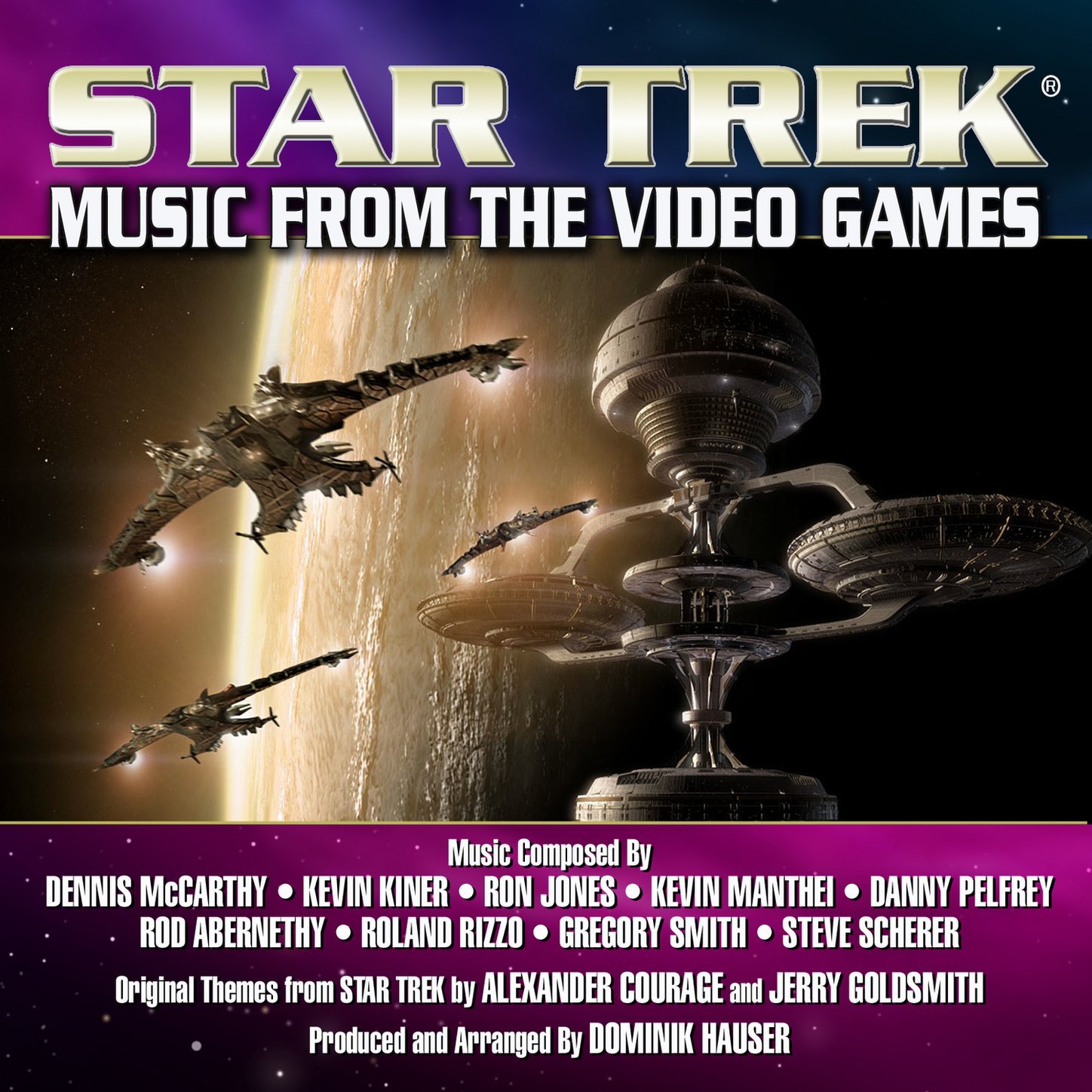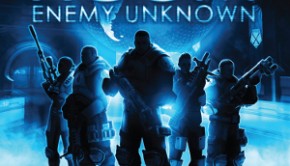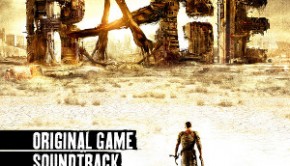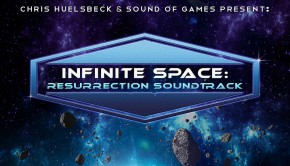Star Trek -Music from the Video Games-
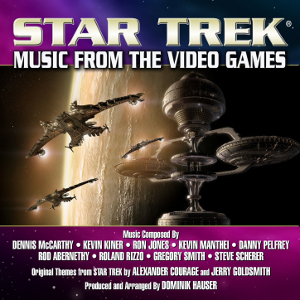 |
Album Title: Star Trek -Music from the Video Games- |
| Record Label: BSX Record |
|
| Catalog No.: BSXCD-8927 |
|
| Release Date: July 19, 2013 |
|
| Purchase: Buy at BuySoundtrax |
Overview
In a way, the history of album releases for Star Wars and Star Trek video games is somewhat ironic. Both franchises have spawned some of the most defining signature sounds of the science fiction genre and there are doubtlessly millions of fans who can hum these series’ main themes off the top of their head. Once you try to get a hold of some of these famous franchises’ video game scores though, you run into trouble, no matter how popular the source material might be. There still is no commercially available album release for any Star Wars game music – all fans have to make do with are usually bonus discs that are released as part of a game’s collector’s edition.
Given the success of many Star Wars games, at least these discs aren’t that difficult to find. As Star Trek games have usually been more low-key than their bigger-budgeted and more popular Star Wars brethren, Trekkies have always had a difficult time to get their hands on music from the Star Trek games, outside of game rips of questionable quality. It was a more than pleasant surprise then that Buysoundtrax Records announced Star Trek: Music from the Video Games, a compilation album of music from the Star Trek video games. While limited to just one CD, the release would span numerous Star Trek games, and in a curious move also include the full score for Dennis McCarthy and Kevin Kiner’s Star Trek: Borg. While the reasons for this focus on one of the lesser Star Trek games remained a bit of a mystery, Star Trek: Music from the Video Games still promised to be an exciting opportunity that could fill a gaping hole in the catalogue. Instead of simply taking the original recordings from the represented games – reaching back as far as 1996 – Buysoundtrax Records hired arranger Dominik Hauser to give the tracks a facelift, while staying close to the originals. Released in physical and lossless digital format, Star Trek: Music from the Video Games came with informative, if not particularly exhaustive liner notes by Randall Larson which gave some context to the different scores represented on the album – a welcome addition, as Star Trek: Music from the Video Games brought together music from 13 different Star Trek games.
Body
How do you properly represent 13 games on one soundtrack album, particularly if one of those literally takes up half of Star Trek: Music from the Video Games? The album producers have found a clever enough way around this issue: they represent most games through its main title piece. This turns out to be a smart choice, because it’s usually these introductory cues that give composers the opportunity to write at their most expansive and melody-oriented, as they “provide music that reflects a similar musical sensibility” to the iconic Star Trek film scores without outright copying them (Larson in his liner notes). In other words, a game’s main title is the ideal place for composers to both pay homage to and put their spin on the classic, sweeping themes by Alexander Courage and Jerry Goldsmith.
Not surprisingly, different composers tackle this challenge to varying degrees of success, but in general, the quality of music on Star Trek: Music from the Video Games‘ first, main themes-laden half remains high. Things start of promisingly enough with Kevin Manthei’s “Main Title” from the compilation’s most recent game, Star Trek: Online. Opening with Alexander Courage’s iconic theme, Manthei quickly steers the piece into a spirited march over a new brass melody of his own that’s bright and optimistic rather than bold, but still pushes the piece forward while keeping the melodic content catchy and rousing. Despite its short running time, the cue develops satisfyingly, and backed by cooing female choir has just the right feeling of exploring outer space. Only the patently synthetic sound of the fun brass motif after 1:35 is a bit of a detriment.
Another piece that bursts of forth with energy, but is infused with more sweeping cinemascope sensibilities is Rod Abernathy’s “Main Title” from Star Trek: Legacy (interestingly, Abernathy’s collaborator on the game, Jason Graves, barely rates a mention in the booklet notes). The cue presents a dignified French horn melody which is a worthy addition to the many noble brass melodies that the optimism of the Star Trek franchise has inspired throughout the decades. Longer and more expansive than Star Trek: Online, Legacy has the full-bodied boldness and romanticism one expects from a classic Star Trek opening title, mixed with martial elements that add some drama to the cue. Unfortunately, what holds the composition back is its rearrangement, starting with the cue’s main melody, which is now first presented on French horns rather than on solo trumpet – the latter a more inspired choice than the more stereotypical use of French horns. The new arrangement also does away with the choir included in the original recording and generally lacks much of the excitement that once characterised the piece. The composition’s considerable substance still carries the music, but the new arrangement is dynamically rather flat and feels too tame. Similarly, “Kirk’s Theme” from Legacy is presented here in a considerably softer rendition than on the game’s original soundtrack, almost 20 seconds slower than previously. However, these changes are less of an issue here, as the piece is mostly lyrical in nature – a bit of a surprise, given it was written for a character as impulsive as Captain James Tiberius Kirk. No matter, as Kirk’s theme, a more tender melodic idea than Legacy‘s main title, is just as attractive as that earlier track. The cue’s second half helps turn the composition into one of the album’s highlights, as it brings some sense of whimsy and wonder through its chimes and flighty woodwind motifs in the background, while the proud, rolling string melodies further underline Abernathy’s skills as a tunesmith.
The only tracks to best those by Abernathy (and Graves) are Ron Jones’ contributions. Well known for his Next Generation and Family Guy scores, Jones’ “Main Title” for 1997′ Star Trek: Starfleet Academy is the album’s strongest composition. Originally included on one of Western game music’s first live orchestral soundtracks, this main title is one of the very few Star Trek game score compositions that have travelled outside of the franchise, as it was included on Silva Screen Records highly-regarded Space 3: Beyond the Final Frontier‘s compilation. It’s a surefire sign of the cue’s quality, and while its synthetic rendition on Star Trek: Music from the Video Games isn’t as vibrant as its orchestral performances, the track remains a joy to listen to. In short, Starfleet Academy‘s main title has everything one would expect from a superior Star Trek overture: a sense of wonder and grandeur, communicated through memorable brass fanfares and motifs, as well as enveloping and warm string melodies that underline the romanticism of spacefaring. Bolstered by some of the most colourful orchestrations of any Star Trek game, Starfleet Academy‘s main title also manages to artfully incorporate Alexander Courage’s theme without overquoting the familiar melody. All things told, Starfleet Academy‘s main title is among the best overtures the Star Trek franchise has produced.
Jones’ main title for Starfleet Command isn’t quite as strong, but it’s built from the same winning materials and manages to differentiate itself from its predecessor through its more martial overtones. Starfleet Command‘s main title is also noteworthy for its demonstration of how much potential lies in a rearranged rendition of Star Trek music that’s of an older vintage (not that this potential is always fully realised on this album). While Jones’ work for Starfleet Command was originally presented in relatively short cues on Star Trek: The Next Generation: The Ron Jones Project, Hauser combines Jones’ Federation tracks from that album into one cue. The resulting composition still flows nicely and also benefits from a much improved sound quality that outclasses the original’s boxy sound, which mixed live and synth elements not too convincingly.
The same compliment can’t be paid to the main title of Star Trek: Bridge Commander. The piece itself is more or less the end titles of Star Trek: The Motion Picture, which contrasted Jerry Goldsmith’s hugely popular main fanfare for the film with the film’s equally outstanding Ilia’s Theme, essentially the movie’s love theme. It’s a marvellous composition, but its arrangement on Star Trek: Music from the Video Games doesn’t do the piece too many favours. Many fans will take issue with the track’s tempo, as it runs almost a minute longer than the original, sapping particularly the fanfare passages of some of their energy. Another issue is the quality of the synths, which are adequate, but pale in comparison to the unbridled energy and romance of the track’s orchestral recording for the film. As with Legacy though, the music’s qualities still shine through brightly. While it’s understandable that the album producers were keen to include a piece as popular as Jerry Goldsmith’s Star Trek main theme, it’s arguably so overplayed by now that only a very strong performance of the fanfare can raise eyebrows, and this is not that performance.
Among all these main titles, there are only a handful that disappoint, but thankfully, they also tend to be among the album’s shorter cues. Two of Danny Pelfrey’s contributions – the main titles for Star Trek: Starfleet Command III and Star Trek: Armada II – can easily be skipped. Starfleet Command III‘s main title feels like filler material, simply presenting choral aahs backed by bell strikes, chimes and harmonious strings for a facile evocation of outer space wonder that features no melody to speak of and doesn’t go anywhere during its running time. Armada II is equally predictable, but fares slightly better, with a militaristic tone that pits an expectedly resistant brass melody against generic snare drum rhythms and string accents. Thankfully, Pelfrey redeems himself with one of the album’s best tracks, the main title for Star Trek Voyager: Elite Force. The piece follows in the footsteps of Jones and Abernathy’s work on Starfleet Academy and Legacy, with yet another inspirational French horn melody set against a relatively luxurious orchestral backdrop. Lastly, there’s Steven Scherer’s main title for Star Trek: The Next Generation: Birth of the Federation, a pleasant but not very substantial addition to the album, with only a long-winded, soft violin melody doubled by the French horns to its name.
Arguably, all these main titles are cut from a similar cloth, presenting the optimistic, stately sound so readily associated with the Star Trek franchise. Thankfully, the album producers are smart enough to stir in some tracks towards the end of Star Trek: Music from the Games‘ first half that mix things up a bit. Danny Pelfrey’s “Introduction” from Star Trek: Away Team surprises with the introduction of an insistent electronic pulse underneath its string accents, metal percussion hits and slowly swelling brass figures that later turn into crisis motifs. It’s not an album standout, but has enough energy to remain reasonably engaging throughout its running time. Not surprisingly, “Kelshar” from Star Trek: Klingon Honor Guard brings some new instrumental colours to the table and reflects the Klingons’ militaristic nature somewhat predictably through driving string ostinati and martial brass overlays. These materials are all stock in trade, but composer Roland Rizzo layers the track’s brass figures and unisono string motifs with just enough depth so that the cue doesn’t become another monotonous depiction of warriors marching into battle. The string attacks on “Kelshar” suffer from a relatively thin synth sound and could have done with some more sprucing up, but all in all, “Kelshar” is a nice change of pace. The album’s biggest surprise is “Warrior’s Poem” from Gregory Smith’s Star Trek Klingon, which underscores the Klingons with a remarkably peaceful and almost elegiac cue. The piece could do with more of the vaguely ethnic flute flourishes that all too briefly add some new timbres to the music, but the way “Warrior’s Poem”’s horn and violin melodies graciously glide through space still makes the track a soothing and attractive listen.
All in all, Star Trek: Music from the Video Games‘ first half is a strong collection of Star Trek music that previously was at best very hard to find, with only a few less convincing pieces mixed in. Had the album continued in this fashion, this would have been a solid four star affair. However, the soundtrack’s producers decide to have Star Trek: Music from the Video Games focus on a single Star Trek game in its second half, and this game turns out to be 1996’s Star Trek: Borg – and if you’ve heard the 2007 CD-R release of this score, chances are you’re aware that this is a poor decision. There would have been many, many Star Trek game scores worthier of the extended presentation Star Trek: Borg enjoys here – Ron Jones’ excellent work for Starfleet Academy a prime candidate.
As described in Star Trek: Music from the Video Games liner notes, McCarthy and Kiner had big goals for Borg. Their aspirations included not only a bigger emphasis on orchestral elements than what was usual on Star Trek TV scores, but also the use of more exotic elements which hadn’t featured in the franchise’s TV series yet, such as African percussion and Indonesian Gamelans. Unfortunately, McCarthy and Kiner miss the chance to realise their goal of providing Borg with a sound that breaks new ground for the Star Trek franchise. While it’s true that some elements of Borg have a closer affinity to horror movie soundtracks than anything else in the Star Trek canon up to that point, most of the time the two composers musically translate the fascinating Borg race into murky underscore and perfunctory action cues that keep relying on the same musical ideas with frustrating insistence.
What sets Borg apart from most other Star Trek game scores is its gloomy and claustrophobic mood, a pronounced contrast to the sweeping nature of most Star Trek soundtracks. This might be an apt choice for the fight against the Federation’s most overwhelming enemy. However, on Borg this atmosphere is often expressed by the kind of sparse suspense music that is functional in the context of the game, but on a standalone basis hardly leaves any impression beyond a vague sense of eeriness. Second album track “The Legend Of The Borg” sets the stylistic blueprint. As on Next Generation, the Borg are represented by a droning synth choir, which unfortunately is used by McCarthy and Kiner in decidedly conservative fashion, never developing into more than ominous background humming. The choir is surrounded by subdued layers of sound effects and percussion, including the aforementioned African and Indonesian instruments. Sadly, these are used too sparingly and stereotypically to add as much allure to the music as the composers had intended. “Searching The Borg Ship” proceeds in similar fashion and highlights once more the uncreative use of the Borg synth choir, whose simple chromatic harmonies feel like a lazy short cut to a mildly ghostly atmosphere. Taking also into account the underutilised timbres of the African and Indonesian instruments, Borg can’t help but feel like a missed opportunity to create a memorable and – at least by Star Trek standards – unique score, instead settling for unremarkable sonic wallpaper.
There are only a handful of occasions when Borg’s quieter moments are able to convince, at least to a degree. “”Goldsmith Has Been Assimilated!”” is a reference to Jerry Goldsmith’s Star Trek scores not only in name, but also in the way it tries to underscore the sense of wonder imparted by the exploration of outer space. The track’s relatively intriguing string melody in the first half – over a simple-minded double bass and harp ostinato – and a woodwind solo lost in the emptiness of space in the second part of the cue manage to introduce some much-needed melodic content. “”Welcome to The Collective Cadet””, after opening with a straight reprise of the soundtrack’s main theme, delivers more stealth atmosphere and is the first track to run the way overused two-note harp ostinato into the ground. However, its – again admittedly simple – horn lead gives the music some feeling of dogged resistance, as opposed to rambling through more faceless underscore.
Borg’s action tracks feel as bereft of ideas as their moody counterparts. Things start out on a workman-like note with opening track “Main Theme”, a militaristic march that’s overlaid with an appropriately striding brass melody which despite its generic character does a reasonable job at evoking heroism in the face of the approaching enemy. The general impression that Borg gives off – that of a lack of creativity – unfortunately permeates most actions tracks from here on, starting with “Battle At Wolf 359”, which is happy to plod along for three minutes to simplistic, tiring deep string and snare drum rhythms. These are overlaid with perfunctory slow brass lines that are meant to sound inspiring, but are not only buried too far in the muddy album mix, but are also too clichéd to elicit much fighting spirit. There are some changes of rhythm and texture – most noticeably the introduction of sharp metal stingers that will become the Borg’s second and more effective sonic trademark – but these changes only result in passing interludes, which in their brevity feel perfunctory.
There’s not much excitement to be found on “Battle At Wolf 359”, and this continues with “The Battle Rages” and “Borg Hell”, although the interruption of the ever-same French horn leads and churning deep string rhythms by the orchestral stingers and the Borg choir is more effective here. After “”You Will Be Assimilated. Have A Nice Day”” has once more walked on exhaustingly familiar ground, “”Resistance Is Futile, My Ass!”” starts out by simply reprising the beginning of “Battle of Wolf 359”. After that, the composition continues the impression of tired repetition by reprising all of the elements previously heard on Borg‘s action tracks, combined with shades of the main theme. There’s slightly more variety and development than let’s say on “Battle of Wolf 359”, but it’s still far from being award-winning material. The best thing about Borg‘s soundtrack is “Finale”, which hails victory for the Federation and gives way to the most unadulterated melodic segment on the album, as the main theme returns in unexpectedly noble fashion. This time, it’s not a semi-resilient call to battle, but instead is allowed to breath and expand, recalling – if not necessarily attaining – the majestic quality of the sweeping sound so strongly associated with the Star Trek franchise. The composers still don’t manage to inject enough substance into “Finale” outside of repetitions of the pleasing main theme, but the music is still more entertaining than anything heard up to this point.
Being the oldest game represented on Star Trek: Music from the Video Games, Borg gets the most significant synth quality update of all soundtracks on the album (apart from this, the rearranged pieces are pretty much identical to the originals). Most of the time though, it’s a case of love’s labour lost. True, the whole album sounds far less murky, orchestral lines (the few that exist) are better delineated, the action pieces and their ostinato rhythms benefit from more powerful and realistic instrument samples, and melodic elements like the French horn lead on “”Welcome to The Collective Cadet”” have more impact. Ultimately though, Borg‘s immensely improved sound quality can’t hide the fact that the music’s substance is still badly lacking. In fact, this deficiency is sometime more obvious than before – now that it’s easier to identify the different orchestral lines, it’s also easier to tell how pedestrian they are. Other changes are less about sound quality and more about a different interpretation of the source material, such as the Borg choirs, which are much clearer, but also lighter and less ominous. One might even argue that the muddy sound of the original recording, which obfuscated the music’s details, gave the score a more haunting character, while the rearranged score sometimes feels like somebody switched the lights on inside the once dark and foreboding Borg cube. Once more, it’s commendable that the effort was made to update Borg‘s sound quality, but there are numerous other Star Trek game scores that would have been worthier recipients of all this care and attention.
Summary
Star Trek: Music from the Video Games would have always fallen into two parts, but the album does so more dramatically than one might expect. The first 32 minutes of Star Trek: Music from the Video Games is a smartly compiled collection of main titles from a wide range of Star Trek games, most of them showcasing the same attributes that have come to define the beloved Star Trek sound: an unwavering sense of exploring outer space and the romantic notion of encountering previously unseen wonders, expressed through sweeping melodic statements by French horns and violins, and backed by orchestral touches that evoke the otherworldliness of outer space. None of the reinterpretations of the Star Trek signature sound gathered here break new ground, but most of them apply the formula with strong, sometimes outstanding results, such as Jones’ main title for Starfleet Academy. Not every single track is a winner, but Star Trek: Music from the Video Games delivers about half an hour of solid sci-fi music that is well worth seeking out.
The same can’t be said for the music from Star Trek: Borg, which takes up the whole second half of the album. Despite the composers’ ambitions, the score is almost wholly unremarkable on a standalone basis. Both battle tracks and atmospheric cues are devoid of ideas, repeating the same formula over and over – sparse percussion and droning, chromatic synth layers for the mood pieces, repetitive militaristic rhythms and uninspiring brass leads once the action heats up. It’s a shame, considering that the ingredients for a strong and unusual Start Trek were in place – a fantastic antagonist like the Borg to underscore, and a wider array of instrumental colours to evoke than usually for a Star Trek score. Star Trek: Borg is best left forgotten – which makes it all the more curious that it features so prominently on Star Trek: Music from the Video Games. One can’t help wondering how much better the album would have been had it focused on one of the many stronger Star Trek game scores, or had the album’s running time been filled with more compositions from each game. Star Trek: Music from the Video Games has considerable merit as a compilation of previously unheard music, but it only manages to reach half of its considerable potential.
Do you agree with the review and score? Let us know in the comments below!
3
Posted on March 20, 2014 by Simon Elchlepp. Last modified on January 17, 2016.

